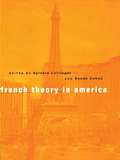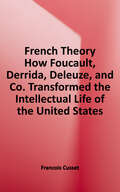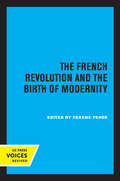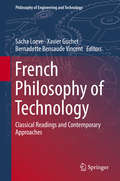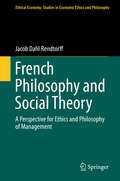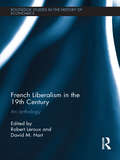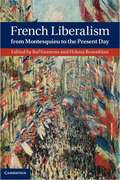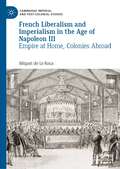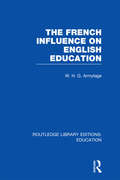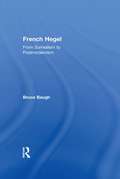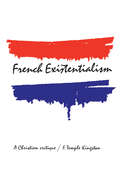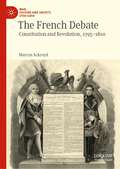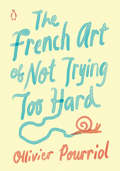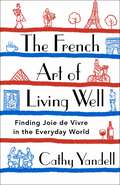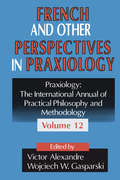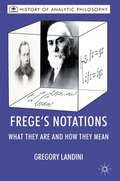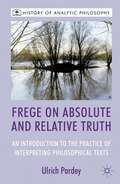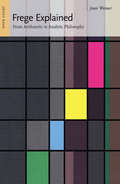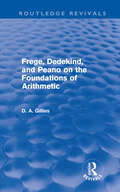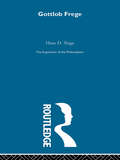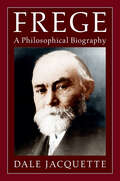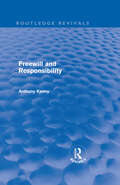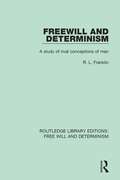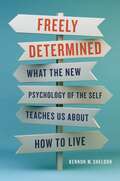- Table View
- List View
French Theory in America
by Sylvère Lotringer Sande CohenWhat does it mean to"do theory" in America? In what ways has "French Theory" changed American intellectual and artistic life? How different is it from what French intellectuals themselves conceived, and what does all this tell us about American intellectual life? Is "French Theory" still a significant force in America, raising conceptual questions not easily answered? In this volume of new work--including the French writers Julia Kristeva, Jacques Derrida, Jean Baudrillard, and Gilled Delezue, as well as essays by Sylvere Lotringer and Sande Cohen, Mario Biagoli, Elie During, Chris Kraus, Alison Gingeras, and Kriss Ravetto, among others--French theorists assess the impact and reception of their work in America, and American-based critics account for their effects in different areas of cultural criticism and art over the last thirty years.
French Theory: How Foucault, Derrida, Deleuze, and Co. Transformed the Intellectual Life of the United States
by Francois Cusset"A great story, full of twists and turns. . . . Careers made and ruined, departments torn apart, writing programs turned into sensitivity seminars, political witch hunts, public opprobrium, ignorant media attacks, the whole ball of wax. Read it and laugh or read it and weep. I can hardly wait for the movie." --Stanley Fish, Think Again, New York Times "In such a difficult genre, full of traps and obstacles, French Theory is a success and a remarkable book in every respect: it is fair, balanced, and informed. I am sure this book will become the reference on both sides of the Atlantic." --Jacques Derrida "The Atlantic Ocean has two sides, and so does French Theory. Reinvented in America and betrayed in its own country, it has become the most radical intellectual movement in the West with global reach, rewriting Marx in light of late capitalism. Breathtakingly moving back and forth between the two cultures, Francois Cusset takes us through a dazzling intellectual adventure that illuminates the past thirty years, and many more decades to come." --Sylvere Lotringer During the last three decades of the twentieth century, a disparate group of radical French thinkers achieved an improbable level of influence and fame in the United States. Compared by at least one journalist to the British rock 'n' roll invasion, the arrival of works by Michel Foucault, Jacques Derrida, Jean-François Lyotard, Jean Baudrillard, Gilles Deleuze, and Félix Guattari on American shores in the late 1970s and 1980s caused a sensation. Outside the academy, "French theory" had a profound impact on the era's emerging identity politics while also becoming, in the 1980s, the target of right-wing propagandists. At the same time in academic departments across the country, their poststructuralist form of radical suspicion transformed disciplines from literature to anthropology to architecture. By the 1990s, French theory was woven deeply into America's cultural and intellectual fabric. French Theory is the first comprehensive account of the American fortunes of these unlikely philosophical celebrities. François Cusset looks at why America proved to be such fertile ground for French theory, how such demanding writings could become so widely influential, and the peculiarly American readings of these works. Reveling in the gossipy history, Cusset also provides a lively exploration of the many provocative critical practices inspired by French theory. Ultimately, he dares to shine a bright light on the exultation of these thinkers to assess the relevance of critical theory to social and political activism today-showing, finally, how French theory has become inextricably bound with American life. François Cusset, a writer and intellectual historian, teaches contemporary French thought in Paris at the Institut d'Etudes Politiques and at Columbia University's Reid Hall. His books include Queer Critics and La Décennie. Jeff Fort is assistant professor of French at the University of California, Davis. He has translated works by Maurice Blanchot, Jean Genet, and Jean-Luc Nancy.
The French Revolution and the Birth of Modernity
by Ferenc FehérWritten from widely different perspectives, these essays characterize the Great Revolution as the dawn of the modern age, the grand narrative of modernity. The scope of issues under scrutiny is extremely broad, ranging from the analyses of the hotly debated class character of 1789 and the problem of the nation state to the "Cult of the Supreme Being," the emancipation of the Jews, and the cultural heritage of the Revolution. This title is part of UC Press's Voices Revived program, which commemorates University of California Press’s mission to seek out and cultivate the brightest minds and give them voice, reach, and impact. Drawing on a backlist dating to 1893, Voices Revived makes high-quality, peer-reviewed scholarship accessible once again using print-on-demand technology. This title was originally published in 1990.
French Philosophy of Technology: Classical Readings And Contemporary Approaches (Philosophy Of Engineering And Technology Ser. #29)
by Bernadette Bensaude Vincent Xavier Guchet Sacha LoeveOffering an overall insight into the French tradition of philosophy of technology, this volume is meant to make French-speaking contributions more accessible to the international philosophical community. The first section, “Negotiating a Cultural Heritage,” presents a number of leading 20th century philosophical figures (from Bergson and Canguilhem to Simondon, Dagognet or Ellul) and intellectual movements (from Personalism to French Cybernetics and political ecology) that help shape philosophy of technology in the Francophone area, and feed into contemporary debates (ecology of technology, politics of technology, game studies). The second section, “Coining and Reconfiguring Technoscience,” traces the genealogy of this controversial concept and discusses its meanings and relevance. A third section, “Revisiting Anthropological Categories,” focuses on the relationships of technology with the natural and the human worlds from various perspectives that include anthropotechnology, Anthropocene, technological and vital norms and temporalities. The final section, “Innovating in Ethics, Design and Aesthetics,” brings together contributions that draw on various French traditions to afford fresh insights on ethics of technology, philosophy of design, techno-aesthetics and digital studies. The contributions in this volume are vivid and rich in original approaches that can spur exchanges and debates with other philosophical traditions.
French Philosophy and Social Theory
by Jacob Dahl RendtorffThis book demonstrates how the conceptual resources of contemporary French philosophy from the early 20thCentury to the present day can be applied to give us new perspectives on business ethics and the ethics of organizations. In providing an overview of possible applications, the book covers a wide range of philosophers, philosophical movements and perspectives and provides detailed analyses of core materials relevant to business ethics. It explores and analyzes French philosophy, taking into account phenomenology, existentialism, French epistemology, structuralism, post-structuralism, deconstruction and postmodernism as well as recent discussions of philosophy of organizations and management. Each chapter contains suggestions for further reading and educational illustrations of possible applications to the mainstream business ethics and ethics of organization literature.
French Liberalism in the 19th Century: An Anthology (Routledge Studies In The History Of Economics #145)
by Robert Leroux David M. HartPolitical and economic liberalism has generally been considered to be of marginal import in France, but at an intellectual level, it is a different story. An exploration of the history of French economic thought shows how a rich intellectual tradition developed during the nineteenth century, which has been previously neglected in English language studies of French thinking. In this important new collection, Robert Leroux brings together key works, both from widely regarded and lesser known authors, whose thinking constituted the core of a singular intellectual movement. These include such figures as Charles Dunoyer, Joseph Garnier, Gustave de Molinari, Yves Guyot, Alexis de Tocqueville, Benjamin Constant and Frédéric Bastiat. Including several works that have never before been published in English, this anthology begins with a full introduction that provides an overview of liberal thought in the nineteenth century, and each text is preceded by a biographical note on the author, and an explanation of the wider significance of the text. This anthology, by bringing to the fore a number of writers and doctrinal positions, seeks to give a coherence, an overall cast to French liberalism without exaggerating its unity. It will be of interest to economists, political scientists, historians, philosophers and sociologists alike.
French Liberalism from Montesquieu to the Present Day
by Raf Geenens Helena RosenblattThere is an enduring assumption that the French have never been and will never be liberal. As with all clichés, this contains a grain of truth, but it also overlooks an important school of thought that has been a constant presence in French intellectual and political culture for nearly three centuries: French political liberalism. In this collaborative volume, a distinguished group of philosophers, political theorists and intellectual historians uncover this unjustly neglected tradition. The chapters examine the nature and distinctiveness of French liberalism, providing a comprehensive treatment of major themes including French liberalism's relationship with republicanism, Protestantism, utilitarianism and the human rights tradition. Individual chapters are devoted to Montesquieu, Tocqueville, Aron, Lefort and Gauchet, as well as to some lesser known, yet important thinkers, including several political economists and French-style 'neoliberals'. French Liberalism from Montesquieu to the Present Day is essential reading for all those interested in the history of political thought.
French Liberalism and Imperialism in the Age of Napoleon III: Empire at Home, Colonies Abroad (Cambridge Imperial and Post-Colonial Studies)
by Miquel de la RosaThis book explores the interplay between liberalism and imperialism in Second Empire France. By examining the political dimension of imperial expansion and the power of words in shaping public opinion, it sheds light on the ways in which liberal ideas developed in the nineteenth century. In contrast to Britain, French imperialism in the third quarter of the nineteenth century was fostered by a Bonapartist regime that liberals needed to fight in order to build their own political brand. The author argues that the 1860s were not so much a period of ‘liberal empire’ in France as has traditionally been suggested, since liberals were in fact more conveyers of political change rather than supporters of the regime. To demonstrate how French liberals succeeded in configuring an alternative political option, the book explores their attitudes to the expanding colonial empire of Napoleon III in the 1850s and 60s through the analysis of parliamentary debates, the press and published texts. Providing three in-depth case studies on Bonapartist expansion projects in Algeria, Cochinchina and Mexico, the book provides new insights on the foundations of the liberal position on imperialism, and the intellectual outlooks and belief systems that informed these views. Analysing discourses and ideas, as opposed to facts and policies, this book presents a new perspective on the nature of the French Second Empire and illustrates how this shaped a specific liberal political culture in France.
French Influence on English Education (Routledge Library Editions: Education)
by W H ArmytageIn this volume the author discusses the influence of France from the Norman invasion to the late 1960s. French thought and ideas are examined and more tangible evidence is also given of the widespread and often unnoticed influence that France has exerted on English education.
French Hegel: From Surrealism to Postmodernism
by Bruce BaughFirst published in 2003. Routledge is an imprint of Taylor & Francis, an informa company.
French Existentialism: A Christian Critique
by Frederick KingstonIn this study the author makes a comparison between the two main types of existentialism: the Christian and the non-Christian. The comparison is made on four levels: first, the common situation; second, the possibility and means of communication; third, the chosen methods of philosophy; and fourth, the attitude and interpretations in relation to similar subjects. Although the French existentialists have been greatly influenced by Kierkegaard and by contemporary existentialist thought in Germany, Switzerland, Italy, Spain, and the United States, the study is limited to the existentialism of contemporary French writers. France in the last fifty years has experienced some of the most crucial events of her history and this common setting for both Christian and non-Christian man turns to Christianity and another militant atheism. It is particularly in France that the split is most clearly made between these two varieties of existentialist thought. Dr. Kingston handles the issues in a fair and honest way, neither concealing his own position nor dealing unfairly with those of whom he is most critical. The intelligent English reader, lay or academic, will find this an excellent introduction to a whole area of modern French life and thought with which he is unlikely to be well acquainted.
The French Enlightenment and the Emergence of Modern Cynicism
by Sharon A. StanleySharon A. Stanley analyzes cynicism from a political-theoretical perspective, arguing that cynicism isn't unique to our time. Instead, she posits that cynicism emerged in the works of French Enlightenment philosophers, such as Jean-Jacques Rousseau and Denis Diderot. She explains how eighteenth-century theories of epistemology, nature, sociability and commerce converged to form a recognizably modern form of cynicism, foreshadowing postmodernism. While recent scholarship and popular commentary have depicted cynicism as threatening to healthy democracies and political practices, Stanley argues instead that the French philosophes reveal the possibility of a democratically hospitable form of cynicism.
The French Debate: Constitution and Revolution, 1795–1800 (War, Culture and Society, 1750 –1850)
by Marcus AckroydThis book explores the creation and career of the French Constitution of 1795, operative from the start of the Directory until Napoleon’s takeover in 1799. It explores the composition, history and replacement of the French Revolution’s third Constitution through a focus on the speeches and writings of four sets of political voices discernible in late 1790s France. The four main chapters present these voices as Thermidorians, Conservatives, Republicans and Brumairiens. They reveal the intensity and breadth of the debates generated by the permanent tension between the Constitution and the many ongoing conflicts of the Revolution. Set within and beyond the government and the two legislative chambers, the debates feature numerous conflicts central to the French Revolution including the composition and functions of the public powers, the legitimacy of exceptional laws, the regulation of the press and freedom of religion. This sustained focus on the relationship between the political nation and the Constitution provides a fresh reading of the political culture of the Directory.
The French Art of Not Trying Too Hard
by Ollivier PourriolSick of striving? Giving up on grit? Had enough of hustle culture? Daunted by the 10,000-hour rule? Relax: As the French know, it's the best way to be better at everything.In the realm of love, what could be less seductive than someone who's trying to seduce you? Seduction is the art of succeeding without trying, and that's a lesson the French have mastered. We can see it in their laissez-faire parenting, chic style, haute cuisine, and enviable home cooking: They barely seem to be trying, yet the results are world-famous--thanks to a certain je ne sais quoi that is the key to a more creative, fulfilling, and productive life. For fans of both Mark Manson's The Subtle Art of Not Giving a F*ck and Alain de Botton's How Proust Can Change Your Life, philosopher Ollivier Pourriol's The French Art of Not Trying Too Hard draws on the examples of such French legends as Descartes, Stendhal, Rodin, Cyrano de Bergerac, and Françoise Sagan to show how to be efficient à la française, and how to effortlessly reap the rewards.A PENGUIN LIFE TITLE
The French Art of Living Well: Finding Joie de Vivre in the Everyday World
by Cathy YandellIn the tradition of Bringing up Bebe and French Toast, Cathy Yandell's The French Art of Living Well is a delightful look at French culture, from literature to cuisine to humor and more, showing how the French have captured that magic elixir known as joie de vivre.What is joie de vivre, and why is it a fundamentally French concept?In search of those ineffable qualities that make up the joy of living, this lively book takes readers on a voyage to France through forays into literature, history, and culture. How does art contribute to daily life? Why is cuisine such a central part of French existence? Why are the French more physical than many other cultures? How do French attitudes toward time speak volumes about their sense of pleasure and celebration? And finally, to what extent is this zest for life exportable? These and other questions give way to a dynamic sketch of French life today.Peppered with anecdotes and humor, this book uncovers some of the secrets of the celebrated French art of living well. Drawing from her years of living in France as a student, professor, and mother, Yandell crafts an honest and profound appraisal of French culture and how la joie de vivre can be developed in anyone’s life.
French and Other Perspectives in Praxiology (Praxiology: The International Annual Of Practical Philosophy And Methodology Ser.)
by Victor Alexandre Wojciech W. GasparskiFirst Published in 2018. Routledge is an imprint of Taylor & Francis, an Informa company.
Frege’s Notations
by Gregory LandiniA new approach to reading Frege's notations that adheres to the modern view that terms and well-formed formulas are any disjoint syntactic categories. On this new approach, we can at last read Frege's notations in their original form revealing striking new solutions to many of the outstanding problems of interpreting his philosophy.
Frege on Absolute and Relative Truth
by Ulrich PardeyThis book has two objectives: to be a contribution to the understanding of Frege's theory of truth - especially a defence of his notorious critique of the correspondence theory - and to be an introduction to the practice of interpreting philosophical texts.
Frege Explained
by Joan WeinerWhat is the number one? How can we be sure that 2+2=4? These apparently ssimple questions have perplexed philosophers for thousands of years, but discussion of them was transformed by the German philosopher Gottlob Frege (1848-1925).Frege (pronounced Fray-guh)believed that arithmetic and all mathematics are derived from logic, and to prove this he developed a completely new approach to logic and numbers. Joan Weiner presents a very clear outline of Frege's life and ideas, showing how his thinking evolved through successive books and articles.
Frege, Dedekind, and Peano on the Foundations of Arithmetic (Routledge Revivals)
by Donald GilliesFirst published in 1982, this reissue contains a critical exposition of the views of Frege, Dedekind and Peano on the foundations of arithmetic. The last quarter of the 19th century witnessed a remarkable growth of interest in the foundations of arithmetic. This work analyses both the reasons for this growth of interest within both mathematics and philosophy and the ways in which this study of the foundations of arithmetic led to new insights in philosophy and striking advances in logic. This historical-critical study provides an excellent introduction to the problems of the philosophy of mathematics - problems which have wide implications for philosophy as a whole. This reissue will appeal to students of both mathematics and philosophy who wish to improve their knowledge of logic.
Frege-Arg Philosophers (The\arguments Of The Philosophers Ser.)
by Hans D. SlugaThis book is available either individually, or as part of the specially-priced Arguments of the Philosphers Collection.
Frege: A Philosophical Biography
by Dale JacquetteGottlob Frege (1848–1925) is one of the founding figures of analytic philosophy, whose contributions to logic, philosophical semantics, philosophy of language, and philosophy of mathematics set the agenda for future generations of theorists in these and related areas. Dale Jacquette's lively and incisive biography charts Frege's life from its beginnings in small-town north Germany, through his student days in Jena, to his development as an enduringly influential thinker. Along the way Jacquette considers Frege's ground-breaking Begriffschrift (1879), in which he formulated his 'ideal logical language', his magisterial Grundgesetze der Arithmetik (1893 and 1903), and his complex relation to thinkers including Husserl and especially Russell, whose Paradox had such drastic implications for Frege's logicism. Jacquette concludes with a thoughtful assessment of Frege's legacy. His rich and informative biography will appeal to all who are interested in Frege's philosophy.
Freewill and Responsibility (Routledge Revivals)
by Anthony KennyThis reissue was first published in 1978. Anthony Kenny, one of the most distinguished philosophers in England, explores the notion of responsibility and the precise place of the mental element in criminal actions. Bringing the insights of recent philosophy of mind to bear on contemporary developments in criminal law, he writes with the general reader in mind, no specialist training in philosophy being necessary to appreciate his argument.Kenny shows that abstract distinctions drawn by analytic philosophers are relevant to decisions in matters of life and death, and illustrates the philosophical argument throughout by reference to actual legal cases. The topics he covers are of wide general interest and include: mens rea and mental health, strict liability, freedom and determinism, duress and necessity, intoxication and irresistible impulse, intention and purpose, murder and rape, punishment and deterrence, witchcraft and supernatural beliefs.
Freewill and Determinism: A Study of Rival Conceptions of Man (Routledge Library Editions: Free Will and Determinism #7)
by R.L. FranklinThis book, first published in 1968, examines the complicated issues which surround the problem of freewill. Although it reaches a libertarian conclusion, its focus is largely on other questions. What ultimately is at stake in this debate? What difference would it make whether we had freewill or not? Why must disagreement persist, and why do philosophes each opposed conclusions with such confidence? The answers to these questions open new perspectives.
Freely Determined: What the New Psychology of the Self Teaches Us About How to Live
by Kennon M SheldonA renowned psychologist argues that free will is not only real but essential to our well-being It&’s become fashionable to argue that free will is a fiction: that we humans are in the thrall of animal urges and unconscious biases and only think that we are choosing freely. In Freely Determined, research psychologist Kennon Sheldon argues that this perception is not only wrong but also dangerous. Drawing on decades of his own groundbreaking empirical research into motivation and goal setting, Sheldon shows us that embracing the ability to choose our path in life makes us happier, healthier, and more fulfilled. He also shows that this insight can help us choose better goals—ones that are concordant with our values and that, critically, we&’re more likely to actually see through. Providing readers insight into how they can live a more self-directed, satisfying life, Freely Determined offers an essential guide for how we might recognize our freedom and use it wisely.
